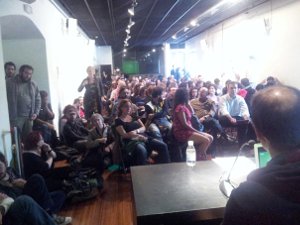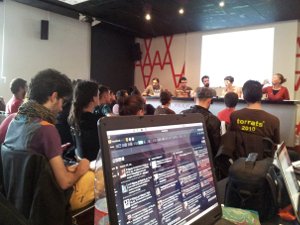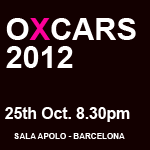2012 Edition

The struggle for the defense of the Internet and free culture grows stronger year after year, inseparable from the struggle to consolidate the paradigm change that goes hand in hand with the digital era.
2012 has seen civil society win great victories over the barbarians:
Social pressure has led to the rejection of the fearsome ACTA, SOPA, and PIPA laws; the UN has recognised freedom of expression on the Internet as a basic right; the EU has declared that filtering links is illegal; the Swiss government has legalised filesharing; the German Constitutional Court has prioritised the right to freedom of expression and information over the interests of cultural lobbies; the Hargreaves Report recommends a fair reform of copyright in the UK; Pablo Soto has been absolved; a European ruling declared that bars, gyms, hairdressers and similar businesses do not have to pay royalties to collection societies; anti-downloading legislation is failing; IP addresses are not accepted as evidence to persecute users in the US…
Nevertheless, we must not let our guard down. New dangers are always lying in wait for sharing and for the Internet as we know it. As Cory Doctorow, rightly says, “the copyright wars are just the beta version of a long coming war on computation.” Copyright lobbies and those in power are always imagining ways to gain ever-tighter control over the way we use computers. Attacks posing as defense of copyright were only the beginning. Further battlefields will be deployed in an attempt to seize civil society’s potential to bring about the cultural and economic – as well as political and social – renewal that the Net is making possible.
Even so, something has changed. The victories achieved are proof that civil society is prepared to defend itself.
Placing restrictions on users and creators is synonymous with blocking the invention of new kinds of economies and sustainability. In the face of this, we continue to come up with new sustainable models adapted to the new conditions for creativity, given that the restructuring of the cultural industries neutralises one of the excuses that are used to try to castrate the Net.
In the meantime, we are preparing to confront the new threats that are taking shape.
The aggressive new laws that have invented the idea of “cybercrime” blatantly manipulate legality in order to gain political control of the Net.
For all of these reasons, civil society is determined to put an end to the repressive approach and the mutilation of the Net, replacing it with a Positive Digital Agenda that favours a democratic renewal that is in line with the times. An overhaul of the legislation that regulates the use of the Internet and the dissemination of information, culture and knowledge in the digital era.
By protecting the Net, we protect a tool for democratic change, a new era.
Increasingly transformative uses of the Net are emerging.
Direct forms of control are spreading to better informed and more connected citizens, allowing them to monitor governments and corporations. Transparency, access to public data and freedom of information, which governments have always tried to hinder, are the prerequisites for any democracy worthy of the name, and are now gaining ground thanks to the efforts of self-organised citizens on the Net. As the spectrum of information that citizens can obtain from governments and companies grows, so does our knowledge and level of control.
In 2011, the Net allowed for the emergence of massive movements that seek to totally transform the political and social framework. In 2012, it is enabling them to adapt to the new tactical needs of the current context.
With all of this in mind, the 2012 FCForum will explore the following subjects, and extract conclusions and useful tools for action from each of them:
Working Areas 2012
Authors’ rights are being used as an excuse to curtail Internet freedoms. Even though it has been proven that cultural industries and their business models do not in fact defend the interests of authors, but rather those of multinationals and middlemen, while authors can actually defend their own interests on the Internet; in spite of ample evidence that it will not only be inevitable but also beneficial to restructure the industry based on the new models of creation and dissemination of culture that the Internet makes possible; in spite of all of this, some artists still believe in the propaganda of cultural industry lobbies, and are being used by them to keep their outdated and obsolete businesses afloat.
This would only be an internal problem for the culture industry, except that it ends up affecting the whole of society because these lobbies are pushing legislation that mutilates the Internet.
This is why it is so important to have an RPCUDAY: Rehabilitation Plan for Creators who haven’t Understood the Digital Age Yet (a project included in the European Community’s Culture Programme) ;-).
Every year, after publishing its influential report on Sustainable Models for Creativity in 2010, the FCForum sets some time aside to help fast track the restructuring of the cultural sector. Not just for the good of the sector, but also to neutralise the excuses for attacking the Internet and the free flow of culture and knowledge.
This year, we will systematise the models that have emerged from the restructuring of the journalism sector, teaching (specifically music teaching), digital fabrication based on 3D copies and intermediary platforms for online music creation and distribution.
But above all, we will propose two models that are fully structured in practical and legal terms: to revolutionise for-profit sharing mechanisms on one hand, and crowdfunding on the other.
- Crowdfunding: a model for empowerment in the current context or poverty management?
Crowdfunding, a financing system that dates back thousands of years, has experienced a remarkable boom on and thanks to the Internet. Even so, we think that it hasn’t really evolved beyond a marketing and pre-sales tool yet, because it has not been able to become a communal shareholding system within the capitalist economic system. We have also seen how institutions sometimes use it to shirk their responsibility to support culture.
For these reasons, we studied the most highly developed platforms and came up with a legally viable proposal to promote a system of mixed public, private and group shareholding, one that favours sustainable culture in today’s context, in which everybody can participate and which is at the service of all.
The proposal also includes the use of patronage laws and some existing European directives, given that it is not possible to imagine a viable creative sector that isn’t integrated into the European and global context.
- The cost of sharing
Although it is wasteful and anachronistic, Spain’s “Sinde” anti-piracy law is too cumbersome and inefficient to be pernicious per se; what makes it dangerous is that it works at the level of the social imaginary to criminalize sharing itself, attacking the distribution systems of digital culture such as torrents and P2P networks. The discourses against “downloads” and against sharing fail to make distinctions between platforms that are simply used as tools for sharing among peers and those that are genuinely new models of distribution for the creative sector – highly efficient, innovative and reliable, very beneficial for creation. A sane society should promote both kinds, and support them for the good of the sector. Or could it be that governments are intent on protecting multinationals rather than authors? As it happens, society is defending authors, while governments serve the interests of powerful cultural sector lobbies.
We, civil society and innovative entrepreneurs, believe that it is necessary to promote and defend sharing, and this includes profit sharing.
This is why, now that some filesharing platforms are turning a profit, they are suggesting a change of the game rules, in which middlemen disappear and profits are shared with the creators of the content shared.
Megaupload was working on the launch of Megabox: a music store that planned to offer 90% of profits to creators who shared their music on the site. The response came swiftly. The US Government called on no less than the FBI to close down Megaupload and requested the extradition of Kim DotCom. But the battle is not over and Kim DotCom has announced that the Megabox project is going ahead and will be released soon.
Other projects are following similar paths. After fending off an accusation in which its founders faced a 6-year jail term, the platform Taringa! is lauching Taringa! Música,a platform that shares profits with the authors.
The FCForum is contributing to this experience, by launching the Spanish section of the project and discovering how much it really costs to share cultural content in the digital age.
A few facts:
Monthly expenses for a website with 10 million users are high, easily exceeding $20,000 per month, which means it could come to around $250,000 per year
Host + Server = $10,000 per month
Staff = $10,000 per month
Website operation and development
Graphic design
Technical support
Administration
Advertising sales and service
And always a surplus for legal services and advice.
If industries accepted fair competition, this would not be necessary.
Audiences are part of the creative process; their property cannot be taken from them.
In 2012 the the European Parliament rejected ACTA after two years of civil society lobbying; two official reports confirmed the failure of the European intellectual property directive IPRED 2011/29; the Spanish government (the fox guarding the chicken coop) published a shameful report against Net Neutrality which it had commissioned from those interested in destroying it (this was precisely the opposite of the Netherlands, which already has legislation in place to protect Net Neutrality); royalties collection societies continue their failure to respect their members and users, while they are sued for fraudulent practices around the world (USA, Belgium, Colombia, Spain, Brasil…), meanwhile, the EU only asks for “a little more transparency” in its proposed directive for these entities.
Civil society, which is much more advanced than legislators in these (and other) subjects, is determined to put a stop to this corporate, repressive approach and to the mutilation of the Net through laws that regulate copyright and royalties, entrepreneurs and users of culture and knowledge. Instead, we want to replace it with a Positive Digital Agenda. A Positive Agenda that protects non-profit sharing among individuals once the work in question has been released, and also protects the interests of all the agents involved when financial profits are generated.
In addition, we defend citizens’ right to participate in the debate and drafting of legislation that affects them.
With this in mind, we will launch a prototype for collective online drafting of legislation on copyright and the Internet, along the lines of an experience tried in Brazil with the Marco Civil do Internet.
Similarly, at the FCForum we will present a collaborative system for the reform of the misnamed “Intellectual Property” Law in Spain and the European Union, based on documents created by civil society at the 2009 and 2010 FCForums, the Charter for Innovation, Creativity and Access to Knowledge and the How-To for Sustainable Creativity, and on a proposal by Quadrature du Net that draws on the recommendations of Communia.
The current tendency for legislators to fail to apply the same justice in the earthly realm and the virtual context is sometimes disguised under the name of “cybercrime”. For example, it requires complex juggling and many headaches for politicians to ban street demonstrations in the physical world, but a few lines hidden away in legislative reforms is all they need to ban demonstrations in virtual space, such as DDoS, he same goes for spying on mail, forcing service providers to monitor their customers, censorship, ignoring the presumption of innocence, etc.
People who are up in arms about repression and censorship on the Net in countries such as China should realise that there are lobbies and legislators who are proposing the same thing here. They should also be aware that the control mechanisms used by repressive regimes are usually paid for by Western multinationals who develop them to control their own employees and then, in order to make the most of their investment, they sell them to States that are repressive to a lesser or greater extent. Once again, control is also big business.
At the FCForum we will study legislative approaches to these issues and ways of defending ourselves from them.
Recent emergencies such as the Arab Spring, #15M, the Occupy movement and Mexico’s yosoy132 have shown that there is an urgent need to update our democracies, and radically changed the relationship between citizens and governments. Organised civil society no longer wants to be a spectator of “democracy.” Our current institutions, born under the industrial paradigm, behave like zombies, emptied of any representatitvity or legitimacy and out of touch with the social needs of the people. But even so, democracy is being re-built by citizens behaving as a smart mob.
At the FCForum we will study the potential of this path, of building a democracy that explores new kinds of participation and engagement technologies, and that includes freedom of information and transparency as built-in, inalienable values.
- Information: Free choice doesn’t exist without free access to information. For this reason, access to public data and freedom of information are the key indicators of democracy in the 21st century. A good example to follow is Iceland’s IMMI or Icelandic Modern Media Initiative.
At the FCForum, we will analyse the strategies employed in new professional and citizen journalism, how the two complement each other, and the attacks they face, as well as looking at ways to defend and support them.
- Transparency: Governments do not engage in transparency. As citizens, we do not know what information the government’s decisions are based on; we don’t know how they spend our taxes; we don’t know who decides our future or for what reasons. Spanish citizens are the least informed of all: Spain is one of the few European States that do not have any transparency legislation. Under pressure, the current government is planning to pass a simulacrUM. Pure whitewash. Even the OSCE has said that the majority of changes in the Spanish government’s proposal are “cosmetic” and fail to meet international standards such as:
– Recognise the right of access to information as a fundamental right (article 20).
– Expand the scope of application of the future law to the legislative and judicial powers.
– Improve the definition of information which currently includes some exceptions not subject to public interest tests.
– Ensure that all exceptions are subject to both harm and public interest tests.
– Ensure that the body charged with overseeing compliance with the right of access to information is fully independent.
This is why there is an urgent need to organise ourselves to achieve a genuine transparency law.
- Networked democracy: In the context of the Net, people are inventing new tools for collective decision-making and creation of legislation, predominantly under citizen control.At the FCForum, we will explore the potential of these mechanisms in order to equip ourselves with tools for the battles that are taking place. We will also share projects such as Democracia 4.0, and the Government of Rio Grande do Sul’s Digital Office– a next generation democracy mechanism that is becoming a prototype for distributed, open control of the State by its citizens. Meanwhile, with its new forms of digital participation and its innovative constitutional process celand is showing us other interesting approaches to the bottom-up drafting of a constitution, by citizens, for all.
For further information, see the Program.
Working method

The FCForum is open to anybody who is interested in participating. It is free, and registration is not required. Everybody can participate, taking into account the different levels of knowledge and skills.
The FCForum working method consists of discussing different hypotheses so that we can all end up working together on a unifying strategy. There are no long speeches, only presentations of the different hypotheses as a point of departure for the discussions.
Discussions will focus on the sticking points between the different proposed models, in an attempt to identify possible mechanisms that can bring them together and make them compatible. We believe it is possible to create an inclusive mechanism within the autonomy of each agent, which can boost all the alternatives by means of strengthening each one, through the others.
The results will be defined online in the weeks following the FCForum, in the form of “recommendations” that can be used to:
- Provide arguments for political “reformers”: they are a tool with which to lobby political parties, institutions and government agencies, with the aim of influencing the legislative changes that are currently being considered and introduced.
- Provide tools for citizens as active agents facing a change of paradigm, so that they can take advantage of its potential to the full.
- Create a network of affinity and global collaboration based on a common interest in the defense of the Internet and free/libre culture.









